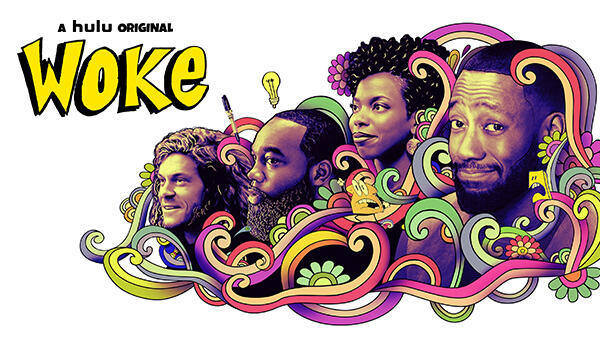In the semi-autobiographical Hulu comedy series “Woke”—created by cartoonist Keith Knight and Marshall Todd—Keef (Lamorne Morris) is the author of a popular, light-hearted, apolitical cartoon comic strip named “Toast and Butter.” His work is a hit among his mostly-white readers, and nearing syndication. And on this road to success—and in the hopes of striking it rich—the Black cartoonist has ignored a plethora of microaggressions from white folks. But when a case of mistaken identity leads to a public confrontation with police, he can no longer ignore the systematic oppression around him. He becomes “woke.”
During his wokeness, his life crumbles. He loses his syndication deal and his inspiration. He works through a mental health crisis and wonders aloud what his art should say, even while he’s afraid to say anything of note. Most of all, he grapples with his perceptions of Blackness in a gentrified San Francisco. While the eight-episode Hulu series “Woke” satirizes the definitions of Blackness and artistic integrity, its inert discussions lead to few laughs.
To most white people—especially his agents at Bloom and Hill syndication—Keef isn’t Black. Walking around in a Dead Kennedys t-shirt and a flat cap, with a satchel bag across his shoulder, he’s a non-threatening hipster. Though none of these characteristics decide Blackness, politically, Keef is untethered from his culture. For instance, when approached by Ayana (Sasheer Zamata, a series highlight), the assertive activist-editor of the local San Francisco newspaper The Bay Arean, to create drawings imbued with social commentary, Keef declines. He explains, “I’m just a cartoonist … I like to keep it light.” Keef would rather save his energy for Golden Con, the event where Bloom & Hill will announce his syndication, than rock the boat.

When navigating white America, Black creatives must either suppress or express their racial politics. The former sometimes offers a quicker path to wealth. Docuseries like “OJ Simpson: Made in America” and “The Last Dance” provide sports examples of the phenomena. Both OJ and MJ remained apolitical for fear that such heady subjects would tarnish their brand. Keef’s outlook changes when cops—racially profiling him as a local mugger—mistakenly tackle him to the ground. The incident not only leaves him shaken, but he soon imagines that his pen, malt liquor bottles, and waste bins can talk. Meant as lampoons of Black stereotypes, yet rarely funny, they accuse Keef of ignoring his Blackness for financial gain. And they’re not too far off.
For instance, in the premiere, “Broke is Woke,” Keef seeks help at Darnell’s Barbershop. His visits to this institution—the Barbershop being a cultural hub for debate among Black people—have become so infrequent, he doesn’t even know the owner sold the place to a bunch of white hipsters, who are now appropriating the business’ legacy for local cred. Instead, the only assistance he finds is in these personified objects. Likewise, Keef’s mental health journey, stemming from a bout of PTSD after the police incident, never peers past the artifice of these animated objects to deliver any real substance.
Too often, “Woke” is a facsimile of more famous works, but without their subtext. In the premiere, director Mo Marable utilizes Spike Lee’s patented double-dolly after Keef’s run-in with the police. Later, Keef tries to throw a dumpster through the window of Darnell’s a la “Do the Right Thing.” Neither instance carries the dramatic weight necessary to garner laughs. They’re merely hollow copies. In episode three, a wealthy white woman pays Keef to appear at her swanky party, an ordeal meant to recall Jordan Peele’s “Get Out.” The jokes here—with Keef fielding questions from white folks about “The Boondocks,” Wakandaland, and OJ—are tired buzzwords rather than thoughtful critiques of the white gaze. Instead, the conceit is an excuse to set up a romantic relationship between Keef and a white Australian artist named Kerstin (Lara Goldie). Though the series tries to explore mixed-raced romances, the subject never progresses past Keef’s own insecurities of dating a white woman.

“Woke” also suffers from thin supporting character arcs. In “Black People for Rent,” Keef’s white eco-friendly stoner roommate Gunther (Blake Anderson) takes umbrage with Keef’s public art idea to advertise Black people for rent. The stunt emboldens white people’s private racism—a subject Gunther has blissfully ignored in the past—to be made public. Rather than closely inspecting Gunther’s white privilege, the episode forgoes such thoughts by re-contextualizing Guther’s arc into him learning to support his friends’ ambitions. Keef’s other roommate, Clovis (T. Murph), the show’s lone comic bright spot, is an unrepentant womanizer. His recurring bit involves lying to women about his profession. The character is meant to be ghastly in his sexual urges, and in many respects it works, as his attempts often go for naught. In particular, Zamata and T. Murph form a potent double act, as the former offers wicked rebuffs to the latter’s advances.
Save for episode eight, which involves white people expressing misplaced sorrow for a missing koala bear, “Woke” offers little else in the way of laughs because Keith and Marshall never define their thesis or their audience. And much as Lamorne Morris tries, he can’t uplift the bland cartoonist into a dynamic lead because Keef doesn’t talk about anything interesting. He’s a passive character in an active world, and the mileage for such runs short, quickly. The same goes for its underdeveloped themes of mental health, definitions of Blackness, white privilege, and artistic integrity. “Woke” might try to incite deep political discussion through sharp satire, but the show never rises from its sleep.
Whole season screened for review.












